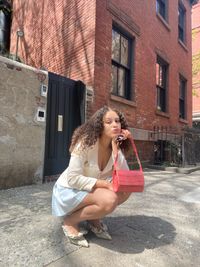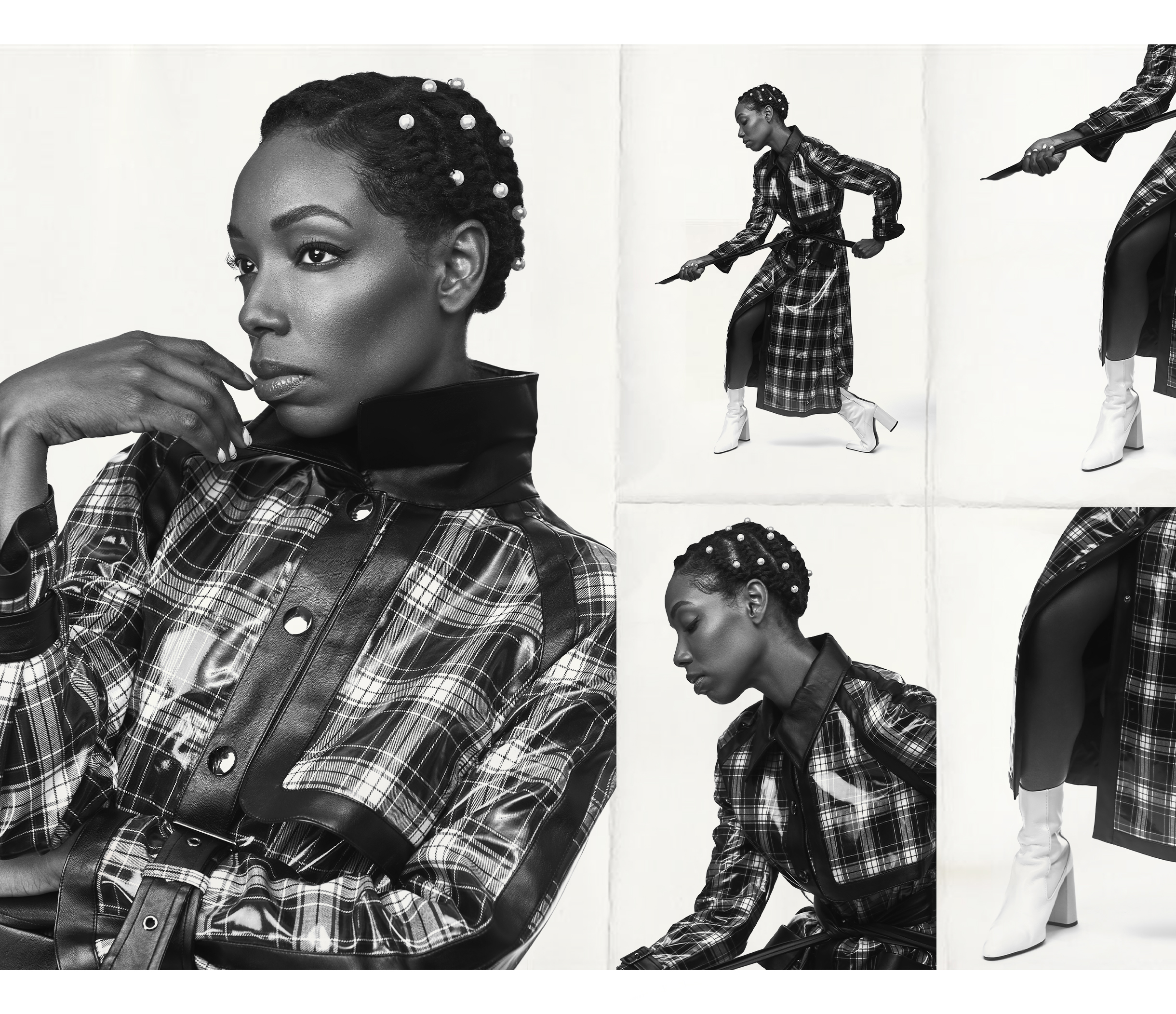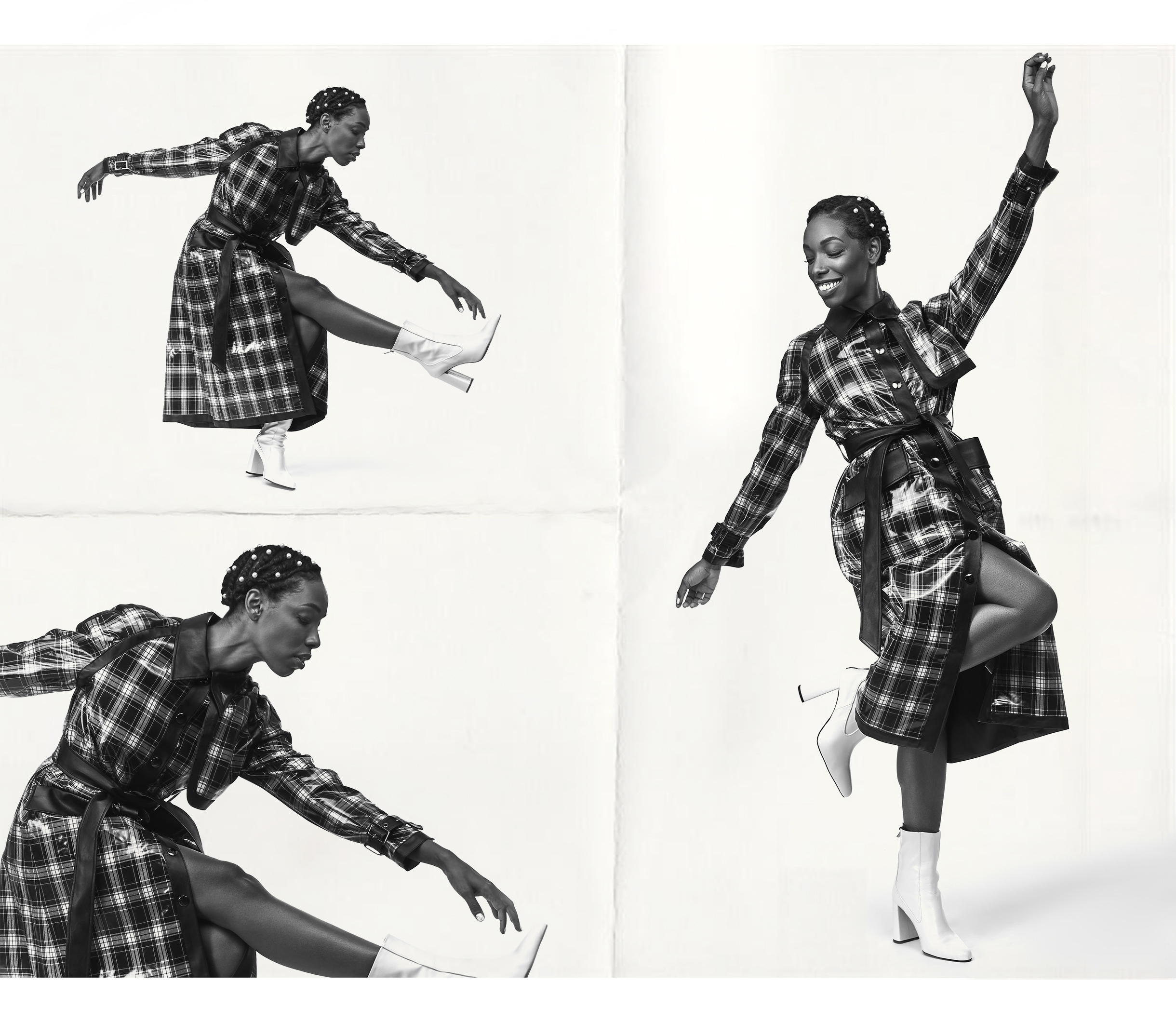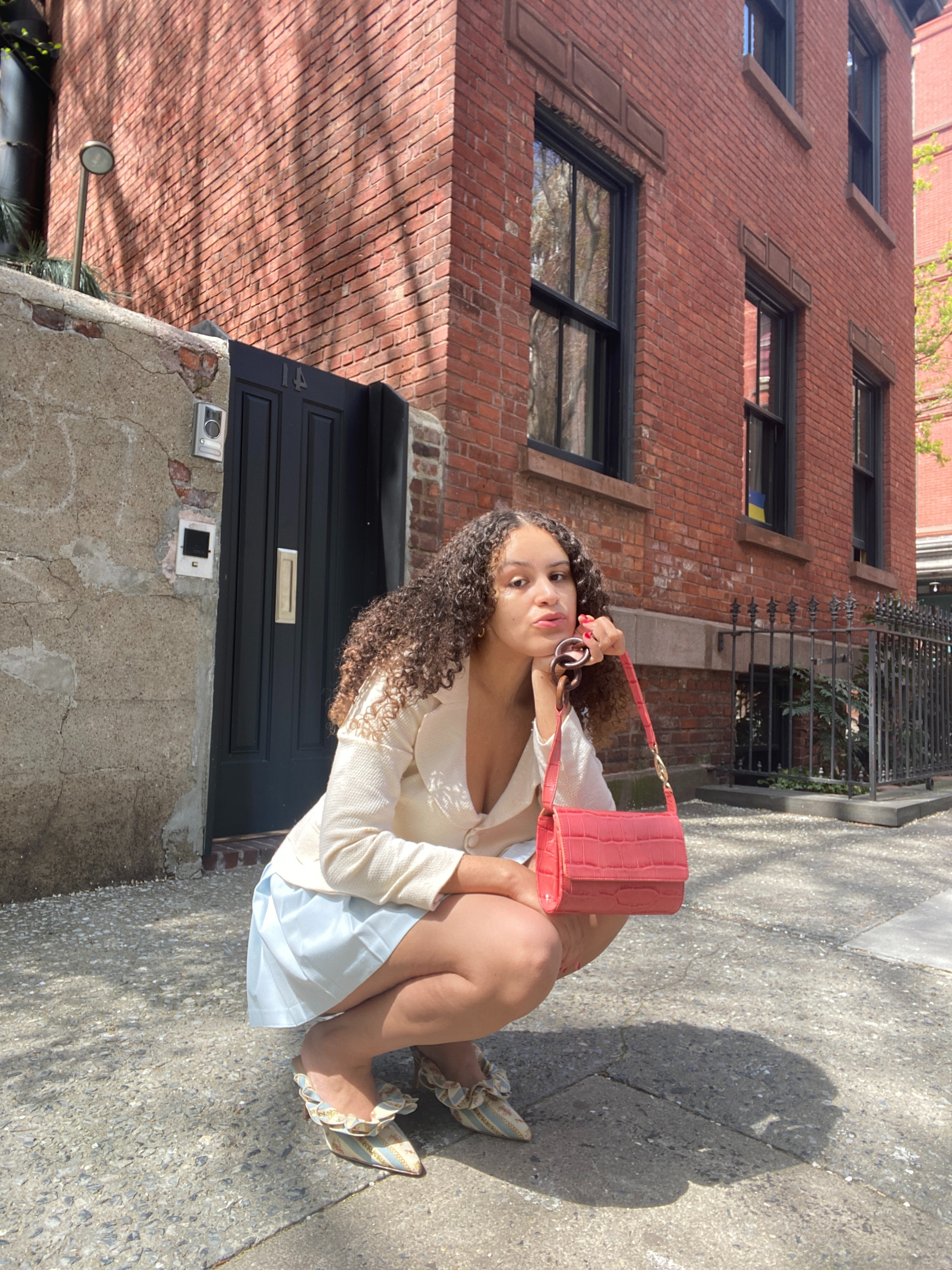From Insecure to Bad Hair, Elle Lorraine Is the Actress to Watch


Hopeful actress moves to Los Angeles in pursuit of her dreams to one day make it big on-screen. It's a story you've heard a hundred times before. It's even Elle Lorraine's story. But in a moment of art (sort of) imitating life, Lorraine is serving a new, thrilling twist on the Hollywood tale. Cue Justin Simien's horror film Bad Hair. Now streaming on Hulu, the film follows Lorraine as Anna Bludso, an aspiring video jockey looking to get her big break on a music television network in the late '80s. In an effort to get ahead in an image-obsessed industry, Bludso makes a major hair decision that has serious consequences and gives a whole new terrifying, and slightly hilarious, meaning to the term "bad weave."
The film’s intention feels similar to the previously lauded Get Out, providing both a satirical and honest take on what it means for Black people to assimilate into predominantly white spaces. It’s a film viewers and Lorraine can see themselves in. While, to the objective onlooker, this role could be a public marker of Lorraine "making it," we know there’s so much more to her story than that. (After all, she has already starred in beloved shows like Dear White People and Insecure.) We spoke with Lorraine about creating her own opportunities in Hollywood, the role that jump-started her career, and what we can expect from her next. Ahead lies a few plot spoilers and a peek into the life of one of Hollywood’s rising stars.

When did you first get into acting, and what compelled you to enter the entertainment industry?
I’m originally from Houston, Texas, and when I was a kid, I would do church plays, so that’s where my love for acting all started. It wasn’t until high school that I decided I was moving to Los Angeles. And throughout my time at Chapman University, while I studied theater, I'd ride the train into town. I would stay for the summers and just get a feel for L.A. Getting to the city was always top of mind for me. Of course, it’s a challenging career to go into. So many people move here for this dream, and you go up against so many incredible actors for roles, so I was trying for a long time. I was doing plays in smaller theater groups for years. At some point, my creative partner Dime Davis and I said, "This is hard, and it’s hard to come about opportunities, so what can we do to help ourselves?” It was then we started creating our own projects. She would write, and I would produce and star in it.
That led us to do a short film together entitled Sugar, which began to make things move. From there, opportunities were coming in, and I started to meet people. And then, I booked the character Trina on Insecure. That was so out of the box of any character I played before, but when I booked that, more people were like, "Oh, this girl is kinda interesting.” As opposed to all the theater work I’d done before, it was one of the most significant on-screen roles I had had yet. It’s honestly so cool because it’s one of my favorite shows, and Insecure opened up a more prominent portal for conversations and opportunities to come about. And eventually, Justin Simien called, and I auditioned for Bad Hair.
What’s interesting about you starring in Insecure and Dear White People and now Simien’s newest film Bad Hair is that they’re all satirical. What role has satire and humor played in your life?
Honestly, for me, I love real characters, and I love to ground them. And I think in comedy the stakes are higher, and when you authentically play a character, I feel that’s when the humor comes in—this idea that this is real but in an outlandish situation. It’s played a role similar to a drama, which is all about creating the character and being honest with it. And then once those parameters are there, you get to have fun and play.
What intrigued you the most about the script for Bad Hair?
Well, I understand this character. I know what Anna Bludso has been through, and I have been through similar versions of this. I have my own hair traumas, and I have my own stories of wanting something so badly and pursuing a dream and having someone tell you that the way you are isn’t good enough. You have to adjust yourself and conform even to be considered, even though you may have the talent. There are all these rules you’re supposed to abide by, but in the end, the only way to win is to break the rules. And so that journey she goes through in the film is almost like a journal entry for me. I loved it. I’m not necessarily at that place in my life where I feel like I have to conform so much. Still, I knew I could be honest and truthful with her. And I was grateful that Justin had written a role like this and used the experiences so many women have and then put it in this world and layered and wrapped it in satire and horror and real authentic commentary.
You’ve already spoken to how you see yourself in parts of Bludso's character, but have you ever felt like you’ve had to compromise on your journey? And do you feel like you’re finally getting to a place where you’re like, "No more”?
At the beginning of my career, many people told me what I needed to look like to be an actress, which is so insane because as an actress you’re taking on so many different characters. There’s a metamorphosis that happens. But all of the advice and feedback I was getting from people that had been in the industry for years had to do with changing who I am—chipping away at, tucking in, or hiding parts of myself so that I present in a cookie-cutter form. And I took that advice because they had been in the industry longer and I wanted to be successful. But at some point, I looked up and said, "I don’t even feel like myself.” So I went on a self-care journey to figure out who I am, and in that process, I decided to be my whole self as much as possible. I think that’s the first step, and don’t get me wrong, I’m still figuring out. I’m still learning, but when I started to make a decision for myself that I wanted to live for myself as much as I can, that’s when more opportunities came.
Speaking of your self-care journey and your hair journey, do you have one moment you can recall when you decided you would define things on your own terms (albeit your relationship to your hair or your approach to your career)?
I think the first moment was when I decided to cut off my own hair. I decided I wanted to have a relationship with it in a way I never had. I’ve never been natural. I've always had chemicals in my hair, gotten weaves, or straightened it. I decided I wanted to start over and try something new and see what happened, and I just cut it all off. I think that was a turning point in my life that I didn’t realize would start to bleed into other areas of my life. So yeah, it is a hair journey.
What’s special about this film is it does such a great job of displaying how, from a very young age, Black women are taught to idolize eurocentric beauty standards. In what ways do you feel this film and your role challenge those standards?
Well, the obvious thing is that there are so many beautiful brown bodies in this film. The casting represents the full diaspora and colors of Blackness—and that’s shown and put before your eyes. The film also speaks to assimilating and how in assimilating we all lose who we are and how we never end up being who we want to be. And in the end, it celebrates the idea that you get to choose how you want to be and look, and that’s beautiful as long as it’s your choice. It celebrates Blackness in a way that doesn’t apologize for Blackness, and it gives a lot of women and men something to be proud of, whether it’s individually or culturally.

Bad Hair has a star-studded cast. Were there any fellow actors or actresses you feel you learned a lot from while working on set together?
Everybody—are you kidding me? Vanessa Williams and Blair Underwood have been doing this for so long. They have such a wealth of knowledge in their toolbox, and they were so generous with it to all of us. And Kelly Rowland, too. As someone who grew up in Houston, Texas, and as Destiny’s Child was such a massive part of my upbringing, Rowland, in my mind, is like, "Oh my god, that’s Kelly.” So I was like, "OMG, don’t be weird," and I wasn’t because they all made it so easy for us. And even being on set with Lena Waithe, we were able to develop our relationship even more. So it was magical to be able to work with every single one of the cast members.
It’s great to hear that your experience bringing this story to life went so well. For you, was prepping for your role as Bludso different from any previous roles you’ve played?
Yes. So this is my first time leading a film. There was so much more material that I had to get into my body and psyche. And I always do a lot of work. I love the work that comes before shooting—studying it and building a character. So I broke the script down a lot. I thought about how I’d transition physically and mentally and how that would influence her journey. But also, we did a lot of tests with the hair for the film, playing with wind and prosthetics. In addition to stepping into the character, I had to get used to the prosthetic hair and had to practice doing the stunts. So all of these layers were things I never got to do before, and I had enough tools in my toolbox going into it.
Hair is a big focus point of the film, but it is equally worth noting the spot-on ‘80s costumes. How was working with the costume department to craft the outfits for Bludso?
The costumes were amazing. I wanted everything. It was incredible because Ceci, who did the costumes, also did the costumes for Dear White People and has a great sense of style. She’s always on point. So going in, there’s a lot of fitting, and the costumes helped me get into the character. And a lot of the costumes were custom for stunts, which added to the entire experience.
Getting more into the plot, what does the film say about the trauma around assimilation and how it impacts both individual and collective memory?
That’s a great question. One, I think it says that any limits we put on each other, other cultures, and social norms break down and weaken the individual and, therefore, the collective. There’s a story of the triumph of us all having the ability to get out of it and grow from it, and we are capable of redemption. And I think that’s one of my parts of it. Just because I’ve been put in a box doesn’t mean I need to stay in a box. There’s a lot of work, and there’s a lot of tearing down my ideas that have been planted that I may have not even known were there. But in that, the muscles we acquire get us out of that thinking.
What has working on this film meant to you personally?
Growing up, I didn’t see many people who looked like me on-screen, and it just makes me proud that so many people said yes to this project so that we could join in on filling in the gap of representation on-screen. I want to make sure I continue to create work that introduces that into the narrative for me. And I want to make sure I don’t lock myself into any boxes and that I don’t even really believe the nos that come to me. Maybe this is a no for this particular moment, but it doesn’t mean it’s a no forever if it’s something I truly desire.
Something that randomly came out of this film, too, I played a lot more with getting braids and twist-outs. This is kind of the opposite of what you think would happen after creating a movie like this, but I’ve been freer in my expression than I was before.
Speaking of your hair, are there any products you love at the moment or hairstyles that you’ve been trying that you can share with us?
I love my twists. I’ve been wearing them all summer and have never done that before. I always have a leave-in conditioner. Giovanni’s Leave-In Conditioner ($24) is a big one I swear by. And then, I still do an Indian clay mask after I take out my twists and before a salon day, and it’s just the best.
So it seems this film has changed everything from your career to how you approach your hair routine. What significant changes or projects can we expect from you next?
You’ll just have to stay tuned.
Photographer: MK McGehee and Alexander Fenyves
Stylist: Toye Adedipe
Hairstylist: Sophia Porter
Makeup Artist: Tiffany Kilgore
Production Studio: Linse Studios
Next: Janet Mock: Writing a New Vision for Hollywood

Jasmine Fox-Suliaman is a freelance writer and editor living in New York City. What began as a pastime (blogging on Tumblr) transformed into a lifelong passion for unveiling the connection between fashion and culture on the internet and in real life. Over the last decade, she's melded her extensive edit and social background to various on-staff positions at Who What Wear, MyDomaine, and Byrdie. More recently, she’s become a freelance contributor to other publications including Vogue, Editorialist, and The Cut. Off the clock, you can find her clutching her cell phone as she's constantly scrolling through TikTok and The RealReal, in search of the next cool thing.